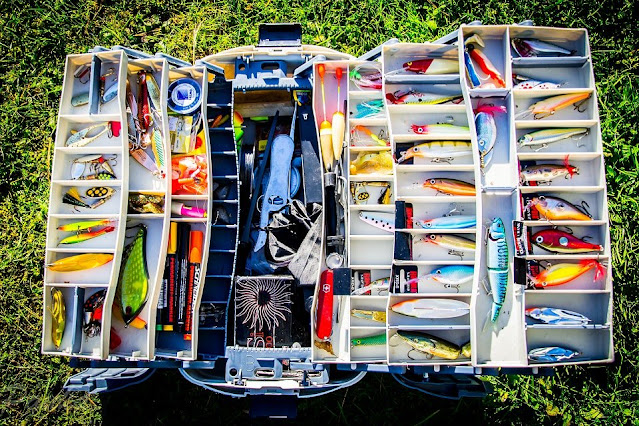Fishing near me :
Hello dear readers of the School of Fishing ! Man stood out from nature and has existed as a separate species for hundreds of thousands of years. Throughout the history of the human race, man has fought for existence. And the most important thing for survival has always been for him to get food.
For a long time, the most important ways for humans to search for food resources were hunting, fishing and gathering edible fruits and plants. Man has long settled near the water, near rivers and on the coast of the seas, the first settlements were discovered. Therefore, catching fish and seafood has become one of the main conditions for humans in the struggle for existence.

It is now difficult for us to judge the ways in which people of the Neolithic used to fish in the old days, but the archaeological finds found at the site of Neolithic sites indicate that such attributes of fishing as spears, tridents and primitive hooks made of stone were already known to man. bones and, most likely, from the thorns of trees. Lakes, seas and rivers stored huge food reserves: crustaceans, mollusks, seals, and first of all, of course, different types of fish.
It is quite possible that the first fishing accessory was a stockade - a sharpened stick with a serrated bone tip, which could be used to hit fish in shallow waters. In other places, all kinds of fish traps could be used - wicker wicker nets, tops, pins, reinforced with stakes. Such traps are still used in some places.

The fishing rod in the form in which we are used to seeing it appeared much later. About 30 thousand years ago, in the Neolithic era, the first hooks made of stone and carved from animal bones became known. The hooks were most likely tied to a fishing line, which was made from the veins of different animals, from vines of plants.
As human communities moved to a sedentary lifestyle, the importance of hunting gradually diminished, because domesticated domestic animals appeared. But humans did not manage to domesticate fish for a long time, so fishing has always played a very important role. Of course, the methods of fishing have improved more and more. And already on the ancient Egyptian frescoes, we see whole pictures, depicting us fishing. Many of the drawings depict people in boats with fishing-rod-like implements.
So, fishing is a very ancient occupation, perhaps, it has existed since the dawn of mankind. And in any case, fishing has helped humanity to survive and preserve its kind in conditions that are very difficult for survival.

Well, and fishing as a sport, that is, sport fishing? In Ancient Greece and a little later - in Ancient Rome, fishing was already elevated to the rank of art and entertainment for aristocrats, at least there are written records of fishing competitions.
The ancient Greek author Theocritus left us a description of fishing with a rod, where he told, for example, about the "deceptive bait" at the end of the line, which can be regarded as the beginnings of spinning fishing. Theocritus' descriptions indicate that already in those distant times, fishing was regarded not only as food, but also as a kind of sport and entertainment.
In ancient China, for about 200 years but a new era, silk lines and iron hooks began to be used in fishing. In Europe, hooks made of metal began to be used only in the middle of the Iron Age, that is, much later. In the notes of the Chinese emperor Jingu (170 - 269), it is described in detail how to make a fish hook from a needle, how to make a fishing rod and fish with rice grains.
The first written document about fishing as a sport was published in England in 1496 "A Treatise on Fishing with a Hook", which was included as an integral part of the "Book of St. Alban." the best sport ”for a gentleman.
"The best sport," writes the venerable lady, "in my simple conviction, is fishing, called Anglerism, which is fishing with a forest and a hook." In this beautiful book, the nun gives instructions not only on fishing techniques, but also raises questions that can now be called “the principles of sport fishing.

The relationship of a fisherman with nature and with other fishermen, getting positive emotions during fishing, respect for fish resources - this is what a lady of the 15th century is thinking about. “Everything in fishing is aimed at the well-being of the human soul. Doing this sport makes him a righteous soul and a healthy body. "
Juliana Berners urges you to be respectful of other anglers, not to spoil their tackle, not to fish where other people's tackle has already been placed, and also not to be overly greedy when catching fish. It is clear that such humane instructions had a huge impact on the development of sport fishing.
In 1653, another significant work on fishing was published. This work belongs to the pen of Isaac Wulton. This book has become just a classic work, and it is not without reason that it has been reprinted more than 300 times since then. The book substantiated the concept of fishing as an occupation only for the sake of pleasure, bringing a person joy from communicating with nature, for the sake of the intensity of emotions that true sport brings. In those days, in fact, the term "fisherman-athlete" appeared.

It is also argued that the real sports angler is always a fan of the "romance of difficulties." Isaac Wulton devoted many lines to describing various tackles and fishing techniques, but he always paid the main attention to fishing, as a sport, as a source of positive emotions, and communication with nature. One of the chapters of the book is devoted to fly fishing with wet and dry flies.
Volton considered fishing with imitation insects to be the highest sporting achievement in comparison with fishing with live baits. Adherents of this trend in fishing still consider fishing with artificial lures as a more honorable and sporting activity.

Despite the spread of progressive views on fishing as a sporting activity, the technique of fishing for a very long time remained at a rather primitive level.
Anglers in many European countries still fished with rods made from sheared hazel, with lines tied from horsehair, and used hooks made in semi-artisan forges.
The scientific and technological revolution of the 19th century with its mass production led to the improvement of fishing equipment. The widest sections of the population were able to join the fishing sport, and not only the aristocrats and the nobility. Sport fishing, which emerged from "noble hunts" as a pastime for the upper class, has become widespread.
Oddly enough, until the end of the 19th century in European countries, fishing lines were made from horsehair. Later, fishing lines appeared from linen and cotton threads, and then from silk threads soaked in oil. In the early 1900s, spinning reels were marketed under the name "Notingham" reels.

The advent of synthetic materials has revolutionized modern fishing. The invention of nylon by the American chemist W. Carothers in 1930 led to the appearance on the market of synthetic lines. The new generation of fiberglass rods is now available. These thin walled rods were more flexible and lighter than even the finest glued bamboo rods.
In the 70s, even more revolutionary materials for making rod blanks appeared - carbon fiber. CFRP rods were even lighter and stronger than fiberglass rods, although their price initially exceeded all reasonable limits. Fortunately, the development of technology has led to a significant reduction in the cost of such rods, now they are available to most anglers.
The sphere of production of artificial lures has been developing at an unprecedented pace lately. Along with the improvement of traditional baits - flies and lures, new baits have appeared - wobblers, poppers, jerkies and soft silicone baits - vibrotails, twisters, worms, slugs.

Talking about the improvement of fishing sport, one cannot fail to mention the development of the production of fishing boats. For sport fishing, completely new types of boats have been designed, such as inflatable boats made of reinforced PVC, simple and reliable, combining low weight and high carrying capacity.
Other innovations have poured into the fishing sports market, previously unthinkable for recreational fishing. From professional fishing to fishermen, athletes came, for example, such a device as an echo sounder. The sports angler can now locate fish, which was previously the advantage only of professional fishermen.
Fishing sport has taken on a truly massive scale in our time. Fishermen from different countries of the world unite in fishing clubs, create their own bases and communities. In many countries, massive fishing competitions are held, which bring thousands of new adherents to this sport.
There are also international fishing competitions. The tourist services market has emerged such directions as fishing safari to exotic fishing places, whether it is sea fishing for marlin and swordfish or traveling to salmon rivers in the remote northern regions.
Nowadays, fishing is a type of active recreation, a source of positive emotions, a mass sport, a means of hardening and a way of communicating with nature.





























